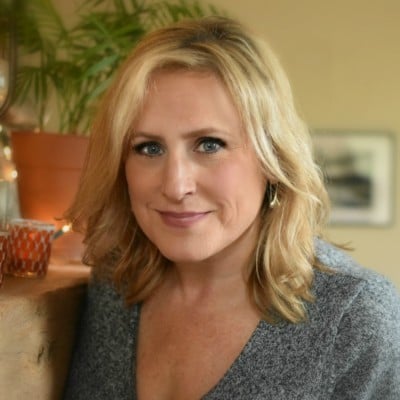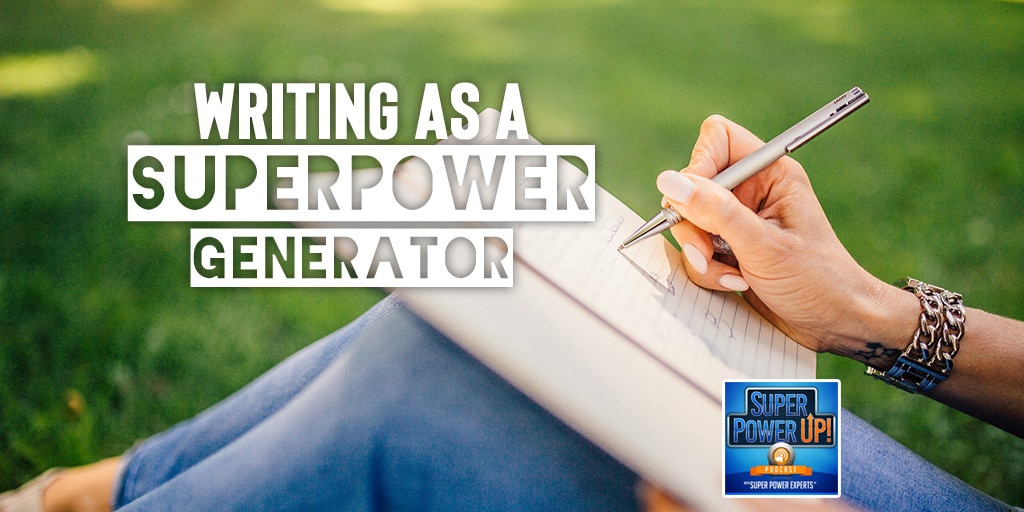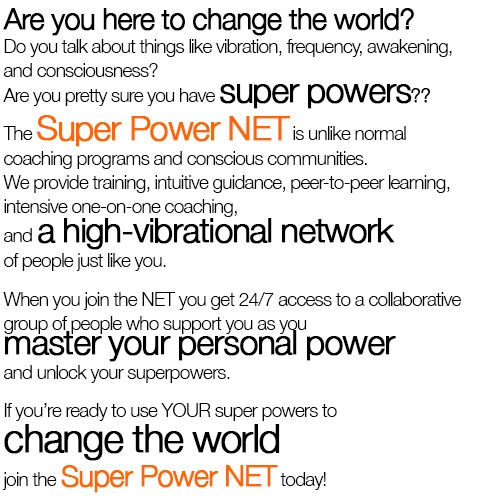
Hello, everyone. This is Tonya Dawn Recla, your Super Power Expert and I have a lovely woman with us today. She’s going to share her brilliance with you. She came to us through our Super Power Expert Jennifer Urezzio who has her show SuperPowers of the Soul which we’re very excited about. Deb Cooperman is … She’s delightful as I said, but she talks about writing so we’re going to talk today about writing as a superpower generator.
Before your mind goes to writing like, “Okay. Everybody writes,” but it’s not. It’s an art, right? It’s how we use the writing. It’s how we embrace it. It’s what voice that we’re allowing to come through that. I know, for me, I worked with a ton of people who as soon as they go into the writing space, it’s like, “Must write and use rules.” They really cut off that creativity. I’m going to blame academia for that and how we’re well..
I totally agree.
I think so. For me, at least, it was like I had to learn all the rules just like I’ve learned how to break all the rules. I’m sure we can get into that, but we’re going to talk today about how to really use that as a growth tool, which is what we’re all about. Right? For those of us who assist people in evolution, we have to be willing to evolve. Deb is known as a writing evangelist and she’s the founder of the Writer Babes which is so perfect and she’s all over the place. She looks really good on paper with regard to interviews and some of the folks she’s worked with and her certifications and all kinds of fun stuff which you can check out at her website.
Today, I really want to dive in and talk about how we can use writing as this really, really powerful tool. Without further ado, please join me in welcoming Deb to the show. Welcome, Deb.
Thank you so much, Tonya. I appreciate it. It’s fun. I’m looking forward to this.
Oh, very cool. Yes, we do have fun over here. Let’s start that fun and ask you. What are your super powers?
I knew this was coming, of course, because I’ve listened to your podcasts.
Yey.
I just got such a really challenging and wonderful question. Part of it is because, I think, what is your super power, I think, it’s super powers. I think, you probably think that too because I was thinking, “Oh, just one?” Come on. I contain multitudes there. Myriads-
You’re like, “Wait, wait, wait.”
You know what I mean. I figured that just to bring one here, one that really impacts my work is one that I probably didn’t see until I was in my late ’30s is that I would say I’m a really good space holder. That shows up in a lot of ways. I mean, in one way, I’m just a really good party host, but also I set really safe spaces in my workshop. I’m able to be with people in really challenging times, and I don’t feel like I have to fix things, which is an amazing gift for someone in my line of work.
I have a way of setting the stage for women to kind of explore and discover the stuff on their own and to dig down a number of the things that they really want to get to, but they might be afraid of. I think that that’s just part of being able to hold all of these big, big, big emotions and big challenging things, good and bad.
Beautiful, yeah. I really like that. It’s fascinating with the writing stuff. Talk to me a little bit about how you got into using writing as a tool. That started really young.
Yeah. Somebody gave me a journal, I can’t remember who it was, right before my 12th birthday. Before they gave it to me, I absolutely know, thinking like, “Oh, I should be writing,” but as soon as they gave this journal to me, it was a little, five-year diary with a little lock on it and all that. As soon as I got it, it was kind of like, “I have a lot to say.” Just really my way. I mean, at that time, I was writing about my sister being annoying or my parents didn’t understand me and stuff like that, but over the years, it just became this wonderful outlet and it’s evolved in a way that I don’t really see how I would have made it through certain things in my life without that.
Sometimes, I probably wouldn’t have created the things in my life that I did without that because it’s a safe place to vent, to explore, to test out things. It’s a magical tool. As far as I’m concerned, it’s really just an amazing, amazing tool.
Very cool. Here’s my confession. When I was young, I had journals and diaries and whatnot. What I found was that I had a hard time telling the truth. Now, of course, I look back on that and see part of the challenge was that there were versions of truth. It was like I was really grappling with that, but what I mean by that is that I would tell stories and so I ended up getting so irritated with myself. I mean, like, “Okay. This isn’t working.” I just couldn’t get in touch with just one aspect of myself and give that voice. It was really obvious to me that I was talking from various components and I didn’t have enough skill set at the time to really reconcile that within myself.
Actually, as a sidebar, you mentioned containing multitudes and that absolutely is one of my favorite quotes ever then I contradict myself very well. I contradict myself. I contain multitudes. I came up against that in really naïve way because I didn’t know so I turned to poetry. I was able to write poetry and be flowery and expansive and not have to worry about how I felt about it or am I saying the truth or do I even want to admit this. I was able to do it kind of in this fiction guys and pull all of that out of me. That became more of my go to notebooks full of poetry, but I had such a hard time journaling.

Sometimes, the truth is found in the stories.
Here’s the thing. You bring up an amazing … like I was sitting here, you’re talking and I’m like writing. I’m so excited. The thing is that there’s no right way to do it. It doesn’t have to be a journal. It doesn’t have to be, “Here’s what happened today.” It doesn’t have to even be … I often say this. Sometimes, the truth is found in the stories. One of the first exercises I do with women who come to my group as I tell them to tell a true story, but add three untruths in the story because what it does is it frees us up. We can tell an honest and real story and an honest and real … and dig in on an honest and real issue potentially if we feel that freedom do not have to say exactly how it happened.
Doing poetry is another opportunity. You can put your truth in poetry. It doesn’t have to be, “I’m challenged because my conversation with this person made me nuts.” It can be steaming red anger. Whatever it is that the words there that come out in a poetic form that are pulling that emotion and pulling that stuff out of you doesn’t have to be one way. That’s the magic of it. You did do it. You did whatever it is. To me, it’s not journaling because if I call it only journaling, then people have a vision of what it is. I call it writing practice.
I like that distinction. That’s where I really went to whether it was that creativity and then, of course, as my life expanded, and I got into the arena and had to train agents that there’s versions of truth, they didn’t really like that conversation. It really set the stage for what was to come next. I just didn’t know it at the time. I did, what all of us do, the best we can in that moment of reconciling it and surviving.
I like what you’re talking about because I also noticed this kind of distaste around like going back and reading something and I felt like I was maybe foolish in my assessment at the time because, in retrospect, I was able to glean additional information. It never sat well with me. It’s like, “Oh, how could I thought that?” I’m like, “There’s a whole lot of judgment going on in just this act of writing,” but I think it’s exactly what you mentioned which is you called it like a journal or you call it a diary or whatever.
I just put my deepest, darkest secrets into this thing and I really didn’t have any deep, dark secrets. It was like I talked about everything. I think that that’s what happened is I was putting it in these boxes and having a lot of trouble especially as a young person reconciling that.

This life thing is a process. You don’t just wake up and get it one day.
Right. You bring up another great point is that when you read back what comes up, what do you see? Obviously, you were making up a story about, “This wasn’t right. Maybe I didn’t do it right or I didn’t …” Like you said, was I really not telling the truth? Did I not see? I find amazingly, sometimes, I will look back on things that I wrote, and I know at the time that I was hiding something from myself, and I can read it and I can see underneath how I’m writing around it and I have compassion for that woman because she was almost there and she just couldn’t see it yet.
What I love about that is that it helps me have compassion for the people that I work with, with myself now and to be able to say, “This life thing is a process. You don’t just wake up and get it one day.” Like, “Oh, now I know how to live my life really well.” It’s a process and you’re going to have to traverse all these different challenges and things about yourself and about the world around you. If you’re in process and if you allow yourself that in the way you write, you have an opportunity in there to be kinder to yourself because it’s never perfect. It’s never going to be perfect.
Yeah, that took me a very long time to get to. Part of it was the journey of me having this compelling need to get somewhere. I talked about that a lot about the energetic waves that we agreed to ride here and I wasn’t going to stop feeling less than until I got there and could see why I used that as the drive. I often tell people early on that self-doubt was my secret weapon. Now, of course, self-reflection and introspection, it’s been able to mature, but it took that to go, “Wait, no. No, no.” Like you’re lying. Like what is going on here? That human behavior component was so compelling for me even as I witnessed it in myself.
I think some of that depends on what journeys we select, but it took me a long time to get to where I could relax into exactly what you’re talking about which is the experience of it. We all chose different paths and we all come to it in different moments and that’s okay, but that wasn’t going to be the message early on. Getting from the, “Okay, the writing really worked with you,” what was the transition into working with others on that?
It’s hard to make this a short story, but I’ll do my best.
What we can do is we could take a quick break and then when we come back, you can elaborate on that. Will that feel better?
Exactly the attempt of understanding the story. Great. Absolutely.
Yeah, let’s do that. Before we take a break, let’s tell people where they can go to find out more about you.
Sure. My website is my name, Deb Cooperman, debcooperman.com. I got a little present for your people so if they want to go debcooperman.com/superpowers, they can go pick up a little something that I have for them to help them either get started or deepen their own writing practice.
Oh, beautiful. Thank you so much. We’ve been talking with Deb Cooperman about writing as a super power generator and when we come back, we’re going to dive into Deb’s story about how she transitioned into working with others. I feel like this is going to resonate with a lot of you as you open up to your own gifts and abilities and how you can work with other people. Stick with us and we’ll be right back.
To listen to the entire show click on the player above or go to the SuperPower Up! podcast on iTunes.
Podcast: Play in new window


